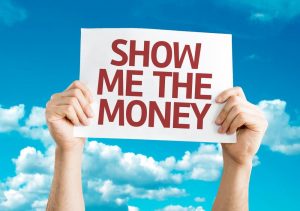
You know that the time devoted to your job is taking you away from the attention your startup needs. The longer you keep your job, the longer it takes your startup to achieve positive cash flow. On the other hand, you need the income from your job just to cover food, clothing and shelter, never mind the capital that is required for the startup itself. It’s quite a dilemma.
But let’s look at it from another angle and perhaps the right answer will become clear. For one thing, when you quit is not a date. It’s a series of metrics. So, let’s rephrase the question(s) based on those metrics:
- How many loyal customers do I need?
- How much do I need to sell each of them to pay my bills for three months minimum?
These are sales-based questions and should be the primary indicators of when you can afford to quit your job.
Many startups, unfortunately, rely on the same “hockey stick” sale projections they used in their business plan – developed before they actually got into the nitty gritty of sales. Did it take into account the cost of sales (i.e., the expense of making sales happen and the costs of servicing what you sell)? Many regret quitting their jobs before they found out it’s the cash flow projection, and not the business plan, that indicates their business’s sustainability.
You might say, “I’ll just borrow the funds to start my business,” or “I’ll just sell some of my equity to some investors,” or even, “My partner will keep working while I start the business.” Any of these might lead you to believe you don’t need to think about continued sales from loyal customers before you get started. But you do! Once you burn through your funds on research and overhead, you’ll have to go back and beg for more. Only this time, without adequate sales, your investors are much less likely give you more money to “burn.” And that’s when you wish you hadn’t quit your job quite that early in the game.
The fact is, you need to have funds on hand to cover at least three months’ worth of expenses before you even think about quitting your job. You cannot rely on all your funds coming solely from sales.
This means that before you even start, you have to identify the “low hanging fruit.” These are the customers that you have presold on your idea. They have made at least a verbal commitment to buy your products. More importantly, you have learned exactly how they want to buy your products and for how much.
Whether you get the three months’ worth of funding from savings, trades, prepays, loans, investors, your partner, or a combination, you still have to establish an early sales pipeline. Even if your investors are so enamored with your idea that they themselves assume smooth sailing on the revenue side, for your own sake you had better make this job #1.
Once you quit your job, there’s usually no going back. And even if you do everything right and establish a sales pipeline that will cover your bills, starting a business is still a big risk. So, as Clint Eastwood said in his 1971 classic movie, Dirty Harry, “Are ya feelin’ lucky?” You will feel a lot more “lucky” if you have the customers before you quit your job!
Who We Are

Michael Houlihan and Bonnie Harvey co-authored the New York Times bestselling business book, The Barefoot Spirit: How Hardship, Hustle, and Heart Built America’s #1 Wine Brand. The book has been selected as recommended reading in the CEO Library for CEO Forum, the C-Suite Book Club, and numerous university classes on business and entrepreneurship. It chronicles their humble beginnings from the laundry room of a rented Sonoma County farmhouse to the board room of E&J Gallo, who ultimately acquired their brand and engaged them as brand consultants. Barefoot is now the world’s largest wine brand.
Beginning with virtually no money and no wine industry experience, they employed innovative ideas to overcome obstacles, create new markets and forge strategic alliances. They pioneered Worthy Cause Marketing and performance-based compensation. They built an internationally bestselling brand and received their industry’s “Hot Brand” award for several consecutive years.
They offer their Guiding Principles for Success (GPS) to help entrepreneurs become successful. Their book, The Entrepreneurial Culture: 23 Ways To Engage and Empower Your People, helps corporations maximize the value of their human resources.
Currently they travel the world leading workshops, trainings, & keynoting at business schools, corporations, conferences. They are regular media guests and contributors to international publications and professional journals. They are C-Suite Network Advisors & Contributing Editors. Visit their popular brand building site at www.consumerbrandbuilders.com.
To make inquiries for keynote speaking, trainings or consulting, please contact sales@thebarefootspirit.com.







